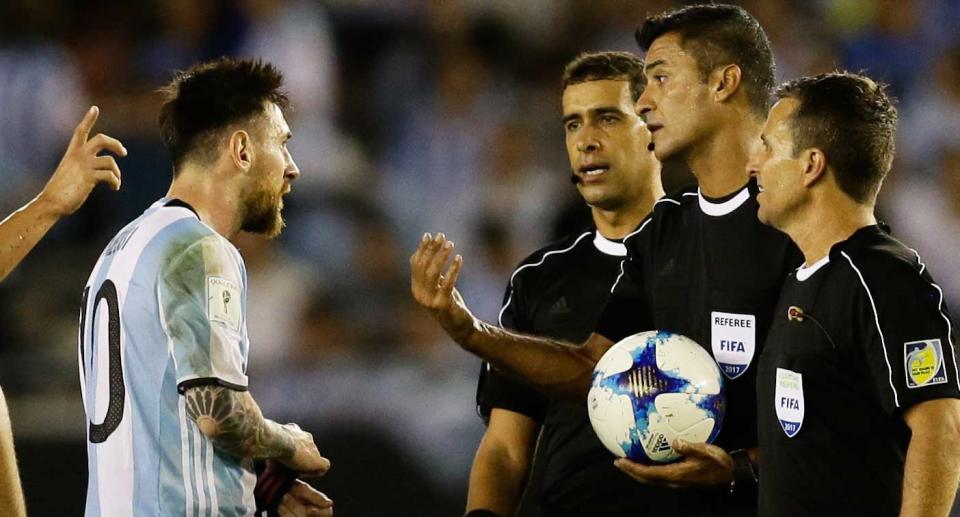Lionel Messi suspended FOUR Argentina games for verbally abusing assistant referee

Just hours before Argentina faces Bolivia in its next World Cup qualifier on Tuesday, the Argentine federation learned that superstar forward Lionel Messi has been suspended for four competitive national team games, effective immediately.
Messi was punished harshly for apparent verbal abuse of an assistant referee during the 2014 World Cup runner-up’s narrow 1-0 win over Chile on Thursday, when he was seen angrily gesticulating toward the referees at the end of a scrappy game.
[ Follow FC Yahoo on social media: Twitter | Facebook | Tumblr ]
“Lionel Messi has been found guilty of violating art. 57 of the FIFA Disciplinary Code for having directed insulting words at an assistant referee,” FIFA wrote in a statement the afternoon of the Bolivia game. The incident was not noted in referee Sandro Ricci’s match report, but television footage clearly showed Messi berating assistant referee Emerson Carvalho after he flagged Messi for a foul. Messi refused to shake Carvalho’s hand following the game. But Carvalho didn’t make a note of the abuse either, and apparently said he couldn’t recall it.
FIFA began an investigation only after the Chilean federation made a complaint on the basis of the footage. The Argentinian federation believed Messi would go free for a lack of evidence.
The suspension — which comes with a fine of 10,000 Swiss francs — applies only to competitive games, meaning they can’t be served in friendlies. As such, La Albiceleste will be without its captain for more than half of its five remaining qualifiers.
The punishment feels particularly draconian as verbal abuse of referees, sadly, is completely commonplace in soccer at all levels. There will be an unavoidable sense that Messi was made an example for his stature more than his actual crime.
Four games, after all – and only competitive matches, at that – is the sort of suspension usually reserved for, say, a punch or head butt, or for a repeat offender of particularly nasty tackles.
On the one hand, Argentina is as well equipped to suffer the loss of Messi as just about any other country, with Sergio Aguero, Paulo Dybala and Gonzalo Higuain also among its corps of strikers – although the latter is suspended as well. On the other, Messi’s absence will be felt for his unrivaled influence on games, not just scoring goals, but setting up chances, disturbing opponents and drawing attention from the defense.
His suspension complicates an already fraught Argentine qualifying campaign. Although La Albiceleste lost the finals of the 2014 World Cup, the 2015 Copa America and the 2016 Copa America Centenario – all either in extra time or on penalties – they made a disastrous start to qualifying for the 2018 World Cup.
Argentina went winless in its first three games in 2016 and then won two. But head coach Tata Martino resigned after a second straight major final was lost to Chile over the summer. And Messi and star midfielders Angel Di Maria and Javier Mascherano quit the team in disillusion — and in protest of the shambolic running of their federation, which got so bad that Messi wound up paying the squad’s security team out of his own pocket after salaries had gone unpaid for six months. They all returned, but the team won just one of its next five qualifiers.
At last, though, things seemed to have been set right of late. After a disastrous 3-0 loss to arch-rivals Brazil in November, the Argentines beat close rivals Colombia and Chile and climbed back into third place in the closely-run CONMEBOL standings, after sitting in sixth and out of the places that would qualify them for the 2018 World Cup in Russia.
And now, when things finally seemed to be back on track, Argentina will be without Messi for its qualifiers against Bolivia, Uruguay, Venezuela and Peru, held between now and Oct. 5.
The Argentinian federation is expected to appeal to the ban.
Leander Schaerlaeckens is a soccer columnist for Yahoo Sports. Follow him on Twitter @LeanderAlphabet.


